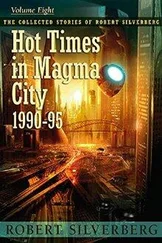Was he alone, though? On his first night, and again the next, he heard laughter in the darkness, borne on the thick dense sweet-scented air. Fuxes did not laugh. The balloons did not laugh.
On the morning of the third day, as he stood on his nineteenth-floor veranda, he saw movements in the shrubbery at the rim of the lawn. Five, seven, a, dozen male fuxes, grim two-legged engines of lust, prowling through the bushes. And then a human form! Pale flesh, bare legs, long unkempt hair! She streaked through the underbrush, giggling, pursued by fuxes.
“Hello!” Morrissey called. “Hey! I’m up here!”
He hurried downstairs and spent all day searching the hotel grounds. Occasionally he caught glimpses of frenzied naked figures, leaping and cavorting far away. He cried out to them, but they gave no sign of hearing him.
In the hotel office Morrissey found the manager’s cube and turned it on. She was a dark-haired young woman, a little wild-eyed. “Hey, is it earthquake time yet?” she asked.
“Not quite yet.”
“I want to be around for that. I want to see this stinking hotel topple into a million pieces.”
“Where have you gone?” Morrissey asked.
She snickered. “Where else? Into the bush. Off to hunt fuxes. And to be hunted.” Her face was flushed. “The old recombinant genes are still pretty hot, you know? Me for the fuxes and the fuxes for me. Get yourself a little action, why don’t you? Whoever you are.”
Morrissey supposed he ought to be shocked. But he couldn’t summon much indignation. He had heard rumors of things like this already. In the final years before the cataclysm, he knew, several sorts of migration had been going on. Some colonists opted for the exodus to Earth and some for the surrender to the Ahya soul-collective, and others chose the simple reversion to the life of the beast. Why not? Every Medean, by now, was a mongrel. The underlying Earth stock was tinged with alien genes. The colonists looked human enough, but they were in fact mixed with balloon or fux or both. Without the early recombinant manipulations the colony could never have survived, for human life and native Medean organisms were incompatible, and only by genetic splicing had a race been brought forth that could overcome that natural biological enmity. So now, with doom-time coming near, how many colonists had simply kicked off their clothes and slipped away into the jungles to run with their cousins the fuxes? And was that any worse, he wondered, than climbing in panic aboard a ship bound for Earth or giving up your individuality to merge with the balloons? What did it matter which route to escape was chosen? But Morrissey wanted no escape. Least of all into the jungles, off to the fuxes.
* * *
He flew on northward. In Catamount he heard the cube of the city’s mayor tell him, “They’ve all cleared out, and I’m going next Dimday. There’s nothing left here.” In Yellowleaf a cubed biologist spoke of genetic drift, the reversion of the alien genes. In Sandy’s Mishigos, Morrissey could find no cubes at all, but eighteen or twenty skeletons lay chaotically on the broad central plaza. Mass immolation? Mass murder, in the final hours of the city’s disintegration? He gathered the bones and buried them in the moist, spongy ochre soil. It took him all day. Then he went on, up the coast as far as Arca, through city after city.
Wherever he stopped, it was the same story—no humans left, only balloons and fuxes, most of the balloons heading out to sea and most of the fuxes migrating inland. He jacked in cubes wherever he found them, but the cube-people had little new to tell him. They were clearing out, they said: one way or another they were giving up on Medea. Why stick around to the end? Why wait for the big shudder? Going home, going to the balloons, going to the bush—clearing out, clearing out clearing out.
So many cities, Morrissey thought. Such an immense outpouring of effort. We smothered this world. We came in, we built our little isolated research stations, we stared in wonder at the coruscating sky and the double suns and the bizarre creatures. And we transformed ourselves into Medeans and transformed Medea into a kind of crazy imitation of Earth. And for a thousand years we spread out along the coasts wherever our kind of life could dig itself in. Eventually we lost sight of our purpose in coming here, which in the beginning was to learn . But we stayed anyway. We just stayed. We muddled along. And then we found out that it was all for nothing, that with one mighty heave of its shoulders this world was going to cast us off, and we got scared and packed up and went away. Sad, he thought. Sad and foolish.
He stayed at Arca a few days and turned inland, across the hot, bleak desert that sloped upward toward Mount Olympus. It was seven weeks and a day until the quake. For the first thousand kilometers or so he still could see encampments of migrating fuxes below him, slowly making their way into the Hotlands. Why, he wondered, had they permitted their world to be taken from them? They could have fought back. In the beginning they could have wiped us out in a month of guerrilla warfare. Instead they let us come in, let us make them into pets and slaves and flunkies while we paved the most fertile zones of their planet, and whatever they thought about us they kept to themselves. We never even knew their own name for Medea, Morrissey thought. That was how little of themselves they shared with us. But they tolerated us here. Why? Why?
The land below him was furnace-hot, a badland streaked with red and yellow and orange, and now there were no fuxes in sight. The first jagged foothills of the Olympus scarp knobbed the desert. He saw the mountain itself rising like a black fang toward the heavy low-hanging sky-filling mass of Argo. Morrissey dared not approach that mountain. It was holy and it was deadly. Its terrible thermal updrafts could send his flitter spinning to ground like a swatted fly; and he was not quite ready to die.
He swung northward again and journeyed up the barren and forlorn heart of the continent toward the polar region. The Ring Ocean came into view, coiling like a world-swallowing serpent beyond the polar shores, and he kicked the flitter higher, almost to its maximum safety level, to give himself a peek at Farside, where white rivers of CO‹sub›2‹/sub› flowed through the atmosphere and lakes of cold gas filled the valleys. It seemed like six thousand years ago that he had led a party of geologists into that forbidding land. How earnest they had all been then! Measuring fault lines, seeking to discover the effects the quake would have over there. As if such things mattered when the colony was doomed by its own hand anyway. Why had he bothered? The quest for pure knowledge, yes. How futile that quest seemed to him now. Of course, he had been much younger then. An aeon ago. Almost in another life. Morrissey had planned to fly into Farside on this trip, to bid formal farewell to the scientist he had been, but he changed his mind. There was no need. Some farewells had already been made.
He curved down out of the polar regions as far south as Northcape on the eastern coast, circled the wondrous red-glinting sweep of the Cascades, and landed the airstrip at Chong. It was six weeks and two days to the earthquake. In these high latitudes the twin suns were faint and feeble even though the day was a Sunday. The monster Argo itself far to the south, appeared shrunken. He had forgotten the look of the northern sky in his ten years in the tropics. And yet, and yet, had he not lived thirty years in Chong? It seemed like only a moment, as all time collapsed into this instant of now.
Morrissey found Chong painful. Too many old associations, too many cues to memory. Yet he kept himself there until he had seen it all, the restaurant where he and Danielle had invited Nadia and Paul to join their marriage, the house on Vladimir Street where they had lived, the Geophysics Lab, the skiing lodge just beyond the Cascades. All the footprints of his life.
Читать дальше












